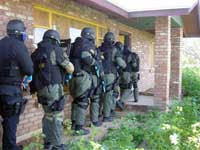Monday, June 27, 2011
The Drug War’s Einsatzgruppen

Career Law Enforcement Officer Edward “Tad” Leach, “Applying the Powell Doctrine to Law Enforcement,” Police Chief magazine, October 2001 (executive summary)
Einsatzgruppen (German) — “Special task forces” composed of police, military, and intelligence personnel deployed to target and eliminate people identified as “anti-German elements” by the National Socialist regime.
The invaders who murdered Hampton, Virginia resident William Cooper swiped about $900 in cash. They seized his gun collection. They took the Lexus from his driveway. By some oversight they neglected to extract the gold fillings from his teeth.
While they made off with a decent haul, the robbers were doubtless disappointed that they couldn’t locate the large stash of illicit prescription drugs they had expected to find. They had the luxury of tossing the home at leisure without worrying about being interrupted by the police — on account of the fact that they were the police.
William Cooper, a 69-year-old retiree who suffered from the familiar variety of afflictions attendant to age, was startled awake on the morning of June 18 by two men who had barged into his home with their guns drawn and ready. Since he lived in a neighborhood in which home invasions (of the non-State-sanctioned variety) were commonplace, Cooper slept with a loaded handgun on his nightstand. He made an entirely proper but regrettably ineffective use of that weapon in an effort to repel the intruders, and was gunned down in his bedroom.
The police raid was triggered by an unsubstantiated tip from a still-anonymous informant that the NASA retiree — who walked with a cane and, according to his neighbors, never seemed to have any visitors — was illegally selling prescription drugs from his home. After they murdered Cooper, the police found about two-dozen different prescription drugs in the home, including various painkillers and medications for blood pressure, heart disease, and diabetes.
 |
| Newport News Daily Press photo |
An apparatchik with the Hampton PD insisted that the lethal home invasion had turned up “evidence” of illegal drug dealing. Someone not required to lie for reasons of professional convenience would admit the obvious: The victim of this needless home invasion was simply a sick, helpless old man who made extensive use of his Medicare Part D benefits. Now that he’s dead, the people responsible for killing him are permitted to keep the stolen property as “proceeds” from alleged narcotics dealing.
The lethal June 18 assault on William Cooper’s home was carried out under the supposed authority of Virginia’s Peninsula Narcotics Enforcement Task Force (PNETF).
The “Asset Forfeiture Addendum” to the PNETF’s most recent “Memorandum of Understanding” specifies that “TASK FORCE investigations should result in the seizure of forfeitable assets.” It is also expected that the plunder will be distributed “in a fair and equitable manner,” with a little more than one-third going to the city governments of Hampton and Newport News, a little less than a fifth going to the State Police, and the rest being lavished on the “Peninsula Association of Commonwealth Attorney’s Association” (redundancy in the original). At least some of the boodle would be used to cultivate other informants, as well.
To understand what really happened in William Cooper’s home on June 18, it’s useful to imagine the murdered retiree’s body surrounded by police, prosecutors, and local politicians who pick over his lifeless form like a colony of vultures. The cash is divvied up, with Hampton and Newport News getting about $300 apiece, the State Police receiving roughly $180, and the local prosecutors laying claim to about $120. For taking the lead in the heist, the Hampton Police Department is permitted to keep Cooper’s car and gun collection, to use or liquidate as it sees fit.
As this is a “civil forfeiture” action, it’s not necessary to prove that Cooper actually broke any law. And since he’s dead, he can’t contest the forfeiture action in court. If police had conducted an actual investigation, rather than staging a home invasion robbery on the pretext provided by an unsubstantiated tip from an unknown informant, they and their cohorts wouldn’t have been rewarded with this modest haul.
 |
| The Gilbert SWAT team, as depicted on its website. |
Gilbert, Arizona resident Ross Taylor was fortunate enough not to share William Cooper’s fate when the local counter-narcotics task force staged an assault on Taylor’s home.
This has to be considered a species of miracle, given that the raiding party consisted of at least a dozen masked commandos who were clad in riot gear, packing assault rifles, and obviously eager for an opportunity to put a boot on someone’s neck.
The throng of armed tax-feeders that laid siege to Taylor’s home consisted of five undercover officers and seven from the criminal apprehension team. As the Phoenix New Times reports, the police raid came in response to a tip from the guy who installed Taylor’s satellite TV system, a collectivist drone with the soul of a Stasi informant who who spied a tiny amount of pot in the house and did his duty. As an overture to the assault, the raiders cut power and water to the targeted home, presumably to prevent anyone inside from disposing of the purported contraband.
Taylor had just purchased his home at the time of the raid. Three employees of a local moving company were present when the stormtroopers arrived; they were handcuffed and detained for more than an hour while the raiders interrogated Taylor and ransacked his house.
As it happens, there was marijuana in Taylor’s home, but it wasn’t contraband. Taylor is a card-carrying medical marijuana patient who is permitted, by what the Arizona government presumes to call the “law,” to own up to 2.5 ounces of marijuana.
Taylor patiently explained these facts to the bellicose bullies who were holding him at gunpoint. When he showed one of the SWAT operators his state-issued medical marijuana card, the masked invader told him, “I don’t even know if you’re supposed to have this card,” referring to a lawsuit filed by Jan Brewer’s administration against Proposition 203 (the Arizona Medical Marijuana Act), an initiative that passed last November.
Under the terms of that statute, as elucidated by the Arizona Department of Health Services (DHS), those who qualify for medical marijuana cards “can obtain medical marijuana from a dispensary, the qualifying patient’s designated caregiver, another qualifying patient, or, if authorized to cultivate, from home cultivation.” (Emphasis added.)
Taylor told his unwanted visitors that he had purchased the marijuana from another card-carrying medical marijuana patient. He was informed that this meant he wasn’t legally in possession of the marijuana, notwithstanding the fact that the text of the statute and the DHS guidelines explicitly permit transactions of that kind.
According to Gilbert PD press flack Sgt. Bill Balafas, “no one is licensed to sell [marijuana] and no dispensaries are open, yet.” Actually, the statute itself, as the DHS admits, effectively licenses anyone with a medical marijuana card to distribute pot to other qualified users.
The agency itself was required to begin issuing permits for marijuana dispensaries at the beginning of June. However, Gov. Brewer instructed Arizona Attorney General Thomas Horne to order the DHS to disobey the law by refusing to accept applications for businesses seeking to open dispensaries. This was done to buy time while Brewer filed a federal lawsuit to overturn the voter-enacted medical marijuana law.
Misguided conservatives who depict Jan Brewer as a champion of “states’ rights” aren’t likely to take note of, or be troubled by, her overture to Washington to practice nullification in reverse by intervening to suppress a voter-enacted measure liberalizing the state’s marijuana laws.
The Brewer administration’s stated reason for seeking an injunction against the law is a fear that state employees would be subject to prosecution for violating federal anti-drug ordinances. That legal argument was supplied by “Keep AZ Drug Free,” the pressure group that opposed last year’s marijuana initiative. (It’s worth pointing out that the organization’s name encompasses the patent falsehood that Arizona, or any other state, is and can be kept “drug-free.”) A more honest assessment would lead to the conclusion that in Arizona, as is the case everywhere in the Soyuz, state and local law enforcement agencies have been subsumed into the federal Drug War apparatus — and that the political elite aren’t willing to end that lucrative arrangement.
The Arizona Criminal Justice Commission, which is “responsible for granting millions of federal and state dollars” to police agencies, has designated support for narcotics task forces, along with related asset forfeitures, as its “first priority.” The Commission’s current “State Strategy” for “Drug, Gang and Violent Crime Control” is commendably barren of idiotic prattle about making, let alone “keeping,” the state drug-free. It acknowledges that Arizona “is the arrival zone for most drugs smuggled into the United States”; that marijuana “remains readily available and is considered the most widely used illegal drug throughout the state”; that “cocaine is readily available throughout Arizona, and that the same is true of methamphetamine.
The policy objective of the Arizona Criminal Justice Commission — as is true in each of the other fifty federal administrative units called “state governments” — is not to eliminate the narcotics trade, or even to abate it in any dramatic way, but rather to transmute it into a reliable source of revenue for the political class and its armed auxiliaries. Toward that end, the Commission in Arizona, with the help of plundered money provided by Washington, created sixteen state “drug task forces” in 2007. Those task forces have “a permanent institutional tie” with the Attorney General’s Office of Financial Remedies.
Arizona’s coercive sector has benefited tremendously from “the overwhelming success of the asset forfeiture [program] in Arizona,” boasts the Commission. In the year following creation of the sixteen state counter-narcotics task forces, revenue from asset forfeitures more than doubled — from $19,576,626 in 2006 to $40,297,456 in 2007.
 |
| Which is the more urgent threat — UN “peacekeepers” Congo… |
 |
| … or militarized police at home? (Note the tally of “kills on the APC.) |
The U.S. government has eagerly tutored other countries in the use of “non-conviction-based” confiscation — that is, seizure of property from people never found guilty of a crime.


Please tune in each Saturday afternoon from 4:00-6:00 Central Time for Pro Libertate Radio on the Liberty News Radio Network.
Dum spiro, pugno!
Content retrieved from: http://freedominourtime.blogspot.com/2011/06/drug-wars-einsatzgruppen.html.



























